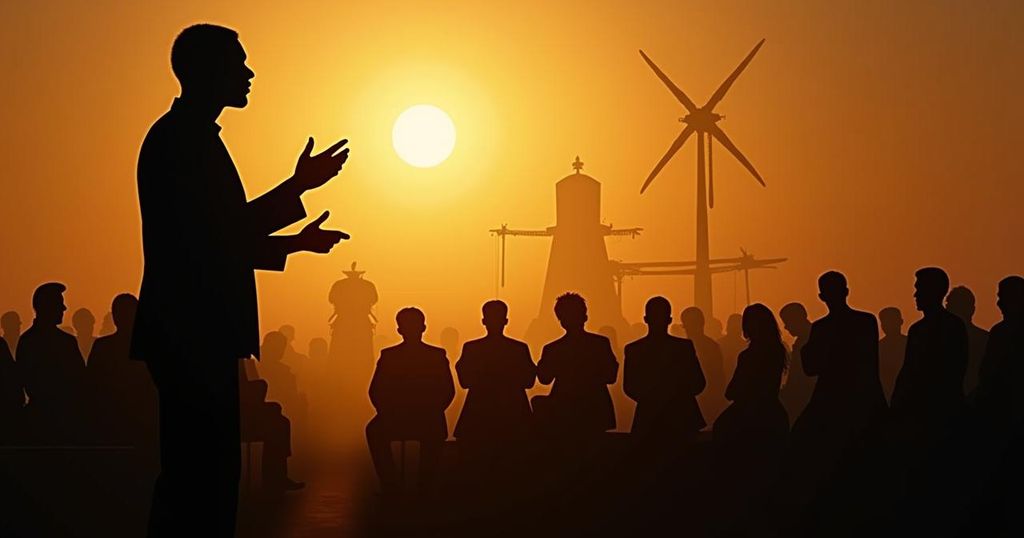Egypt Affirms Stance on Existential Threat from GERD During UNGA 79

During the UNGA 79, Egypt’s Foreign Minister Badr Abdelatty emphasized Egypt’s position on the Grand Ethiopian Renaissance Dam, stating it would not overlook threats to its existence posed by Ethiopia’s actions. He condemned Ethiopia’s unilateral operations regarding the dam, which violate international agreements, and highlighted the ongoing water scarcity issues Egypt faces as a result. Egypt continues to seek binding agreements to protect its water rights.
During the high-level General Debate at the 79th session of the United Nations General Assembly (UNGA 79) on September 28, 2024, Egypt’s Foreign Minister Badr Abdelatty expressed Egypt’s firm stance regarding the Grand Ethiopian Renaissance Dam (GERD). He asserted that Egypt will not ignore existential threats posed by Ethiopia’s actions related to the dam, emphasizing that Ethiopia has shown a blatant disregard for the lives of Egyptian and Sudanese citizens. Minister Abdelatty highlighted Egypt’s commitment to monitoring developments concerning the filling and operation of the GERD, stating, “It is a mistake to think that Egypt will turn a blind eye or tolerate a threat to its existence.” He cited Ethiopia’s unilateral actions as violations of international agreements, including the 2015 Declaration of Principles and the 2021 Presidential Statement of the United Nations Security Council. He noted that after 13 years of unsuccessful negotiations, the negotiations with Ethiopia concluded in December 2023 due to continued Ethiopian unilateralism. The minister emphasized the dire implications of the dam on Egypt’s water supply, revealing that Egypt relies heavily on the Nile and already faces severe water scarcity, with per capita water availability well below the global threshold for water scarcity. President Abdel Fattah El-Sisi previously articulated Egypt’s resolve regarding its water rights, calling its share “sacrosanct” and warning against any interference. Furthermore, the Minister of Irrigation and Water Resources, Hani Sewilam, criticized Ethiopia’s motives, contending that the dam is intended to assert political dominance over the Nile. In recent developments, Minister Abdelatty sent a letter to the President of the UN Security Council condemning Ethiopia’s provocative actions and asserting their detrimental impact on regional stability.
The Grand Ethiopian Renaissance Dam (GERD) has been a source of contention between Egypt, Sudan, and Ethiopia since its inception. Egypt relies on the Nile River for approximately 95% of its freshwater supply, making the management of this critical resource a matter of existential importance. The tensions have escalated due to Ethiopia’s unilateral actions regarding the dam’s filling and operation, which Egypt perceives as a direct threat to its water security. Despite years of negotiations aimed at achieving a binding agreement to safeguard the water rights of all three nations involved, the efforts have repeatedly stalled due to Ethiopia’s refusal to compromise. The impact of the GERD on Nile water flows has the potential to affect millions of people in downstream countries, heightening regional tensions.
In conclusion, Egypt’s Foreign Minister Badr Abdelatty has articulated a strong condemnation of Ethiopia’s actions regarding the GERD during the UNGA 79, asserting that Egypt cannot remain passive in the face of threats to its existence and water security. The ongoing dispute underscores the critical nature of the Nile River to Egypt’s well-being and highlights the failure of diplomatic negotiations aimed at reaching a mutually beneficial agreement. Egypt continues to assert its rights and the necessity to protect the lives and livelihoods of its citizens in light of Ethiopia’s unilateral dam operations.
Original Source: www.egypttoday.com








